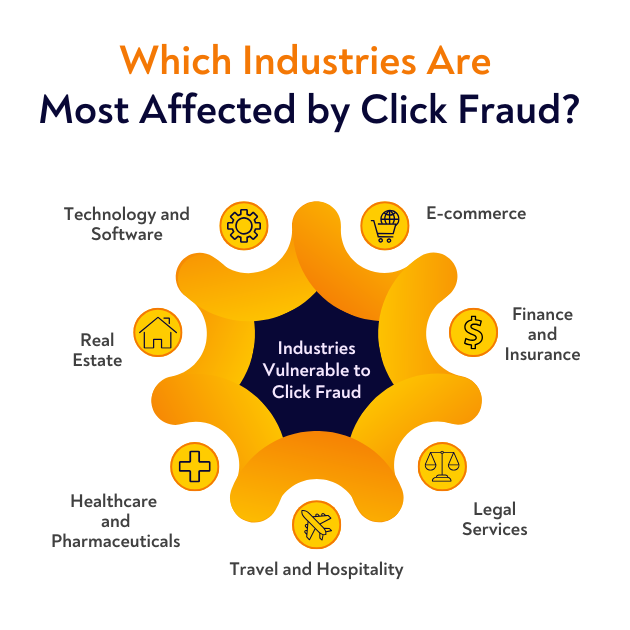Click fraud disproportionately impacts industries where high competition and high CPC are prevalent. These industries often rely heavily on paid advertising to drive traffic, leads, and sales, making them prime targets for fraudulent activity.
The sectors most affected by click fraud include:

Our amazing team is always hard at work
1. E-commerce
E-commerce businesses frequently compete for top ad placements on high-value keywords like product names, brands, and categories. With high CPCs and fierce competition, competitors may engage in click fraud to drain budgets or sabotage campaigns.
In this industry, fraudulent clicks can lead to wasted ad spend, reduced ROI, and skewed campaign data, making it harder to optimize performance.
2. Finance and Insurance
This sector is especially targeted because keywords related to loans, insurance, credit cards, and financial services are extremely expensive. Fraudsters target these industries to exhaust ad budgets quickly. And, unfortunately, high CPCs mean even a small amount of click fraud can result in significant financial losses.
3. Legal Services
Law firms often bid on competitive keywords like “personal injury lawyer” or “divorce attorney,” which can cost hundreds of dollars per click. Competitors or bots may click on these ads to deplete budgets. Click fraud leads to wasted ad spend and reduced lead generation, which directly affects legal services companies’ revenue.
4. Travel and Hospitality
Travel-related keywords (e.g., “cheap flights,” “hotel deals”) are highly competitive and expensive. Competitors or malicious actors may use click fraud to disrupt campaigns and drain budgets, especially during the highly competitive peak travel seasons.
5. Healthcare and Pharmaceuticals
This is another example of a sector with high competition and high CPCs. Keywords related to medical treatments, prescriptions, and healthcare services are costly and highly competitive. Click fraud can lead to wasted budgets and fewer genuine leads, affecting patient acquisition and revenue for doctors and other professionals, clinics, and hospitals relying on PPC ads.
6. Real Estate
Real estate agents and companies often bid on location-based keywords (e.g., “homes for sale in [city]”), which are expensive and competitive. Fraudulent clicks can drain budgets and reduce the effectiveness of lead generation campaigns.
7. Technology and Software
Tech companies frequently bid on high-value keywords related to software, apps, and IT services. Competitors may use click fraud to disrupt campaigns. The consequences of these malicious acts are wasted budgets and reduced ROI on ad spend.
Real Examples of Click Fraud
Click fraud is a pervasive issue that affects businesses of all sizes, from small startups to industry giants. Below are real-world examples that highlight how fraudsters manipulate PPC campaigns and the devastating impact they can have on businesses.
Uber’s $100 Million Click Fraud Scandal
Uber lost over $100 million to a sophisticated click fraud scheme. This story was shared by Kevin Frisch, Uber’s former head of performance marketing and CRM, on the Marketing Today podcast.
During a routine review of their ad performance, Uber made a shocking discovery: Even after cutting their ad budget by $100 million, the number of app installs remained virtually unchanged. This inconsistency prompted a deeper investigation, which uncovered a scheme known as attribution fraud.
Essentially, Uber was being charged for app installs that happened organically, not through paid ads. The ad network had manipulated the data to make it appear as if the installs were driven by their campaigns.
This case sheds light on how attribution fraud operates. Since the data often looks legitimate, it can go unnoticed without thorough analysis. Businesses must carefully monitor their click, conversion, and acquisition metrics to spot discrepancies and protect their ad budgets from such scams.
